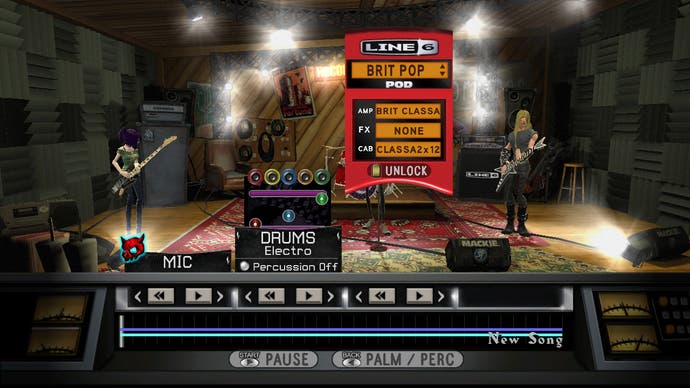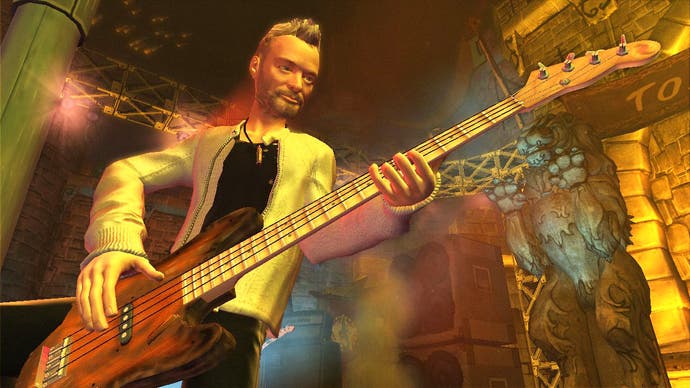Guitar Hero: World Tour
Rocking all over the lounge. Again.
It's a little like beatboxing on a guitar controller, if you can imagine that. You set the tempo and the sound set - jungle, techno, gunshot, rock, metal et cetera - and hold down one of the buttons to set down a beat. You can then adjust and play around with that beat using the other buttons and the touch-sensitive panel. For instance, tapping green on the touch-sensitive panel might add in another beat, holding red might drop everything but the bass. Tilting the guitar alters the volume. What's amazing about it is that practically everything you do sounds good.
The synth machine works similarly, although we didn't see everything it can do. You can either set the keyboard up to work like the guitar - as in, you press a button and strum, and it makes a noise - or use the synth machine to set up a fuller backing track. It's going to be possible to create anything imaginable with these tools (except vocals, disappointingly), from a techno remix of Purple Rain to a metal cover of Umbrella to any imaginable kind of original sound. Activision told us that it's leaving GHTunes - the game's uploading/downloading marketplace for user-created music - completely open, but if there are complaints from copyright holders it'll be obliged to act upon them. We imagine, however, that players will spend much more time creating their own music than copying others.
Once you're done jamming and have all the instruments laid down, you can nip into GHMix, your own little Guitar Hero production studio, to re-order the recording and sort out the mix. Once it's done, it can be exported to play immediately, or uploaded to GHTunes for other people to download and play, complete with band biography and fully-customisable album art. There's so much scope for expanding this in the future; it all depends on just how creative players decide to get with World Tour's music creation.

It's possible that the comprehensiveness of these tools might seem almost ridiculous. Why learn how to play fake instruments to this degree of proficiency when you could be learning an actual instrument? The difference is, though, that we've already learned how to play Guitar Hero - World Tour is giving us the opportunity to transfer those impressive but inescapably useless fake-guitar playing skills into creative endeavour.
And it works. It's fun and completely compulsive, and after weeks or months of experimenting with scales and harmonies and chromatics, figuring out what sounds work well together and messing around with drum-tracks, it's easy to imagine developing an understanding of music that could be put to use far beyond these in-game music tools. People who have fun just jamming in E Major and thrashing out noises on the drums in September might be making sophisticated tracks by next May.
The edge that all of this gives World Tour over Rock Band, and its sequel, is enormous if you're interested in the potential of music creation. If you're more interested in just the track-list and the experience of playing along, the contest is going to be closer. Rock Band is the most professional execution of the beat-matching videogame that yet exists - slick, good-looking and packed with well-chosen tracks - and Rock Band 2 looks like it's going to build on those strengths, offering more music and a better set of instruments. Were these two games competing purely on those terms, Rock Band would probably win out, given its advantages of priority and effortless Harmonix cool next to Guitar Hero's slightly overcooked, self-consciously extreme sense of rock.

But as it is, Guitar Hero: World Tour has carved out its own music-creation niche, and the two games differ enough in what they offer to justify both their places in store shelves. What's more, the eminently sensible decision to make all peripherals for both games cross-compatible ensures that neither will lose out needlessly on potential customers.
Guitar Hero: World Tour is turning us from gamers with plastic, pretend instruments into potential musicians. It is giving us an extremely complex set of tools to create our own music on equipment that we understand and have years of practice using just for fun. There's something so incredible about this, something that really speaks about the magic of videogames in general; how they can educate, stimulate and transcend themselves in the hands of enthusiastic players to become something that we'd never have dreamed of just a few years prior.
Guitar Hero: World Tour is due out in October.


